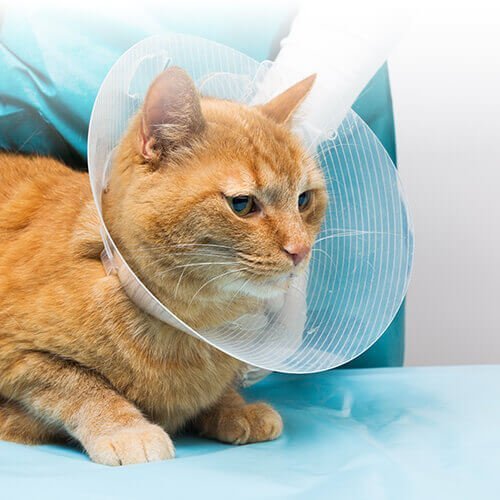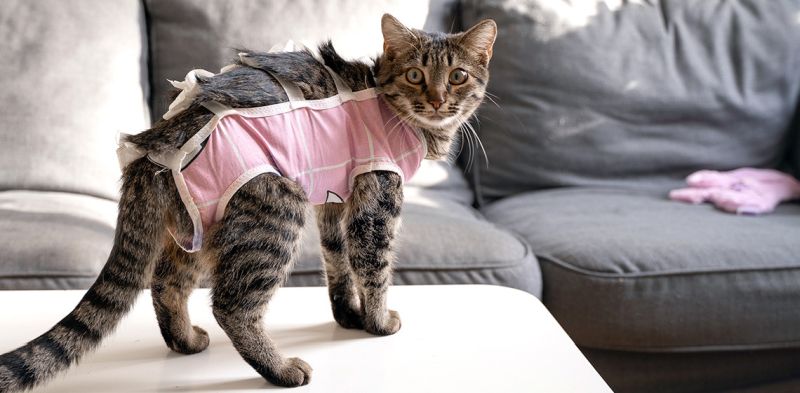
Spaying and neutering your cat is a very important part of pet ownership as it can have direct health benefits. It also aids in reducing the number of unwanted and/or homeless animals, especially if you have an outdoor cat.
Male cats, when neutered, are less likely to mark their territory or exhibit aggression towards other cats. On the other hand, female cats, when spayed, have lower risks of mammary cancer and are less likely to urine mark.
The costs for these surgeries will, of course, vary by location and veterinarian, as well as based on specifics about your animal.
- Neuter
How much does it cost to neuter a cat? In general, in an average clinic, neutering would cost around $50 to $100. This would include the full procedure, anesthesia, and recovery time.
The surgery itself can actually be completed in less than 5 minutes. Neutering involves simple incision being made on the scrotum and then the testicles are being removed.
After 20-30 minutes of recovery time, the cat can be brought home. In fact, both spay and neuter procedures for cats are performed on an outpatient basis.
- Spay
Spay surgeries are more expensive than cat castration cost because they take longer to be carried out as they’re more complicated. Compared to neutering, more intensive surgery is required as the female cat’s abdomen needs to be opened up so that the reproductive tract (the uterus and ovaries) can all be removed.
This surgery takes about 20 minutes, with another 20 minutes in recovery time and on average, will run about $100 to $200. Although complications are very rare, there is a slightly higher chance of risk with spaying, as this is an internal surgery.
Additional Costs of Spay and Neuter in Cats
- Pre–Op Preparations
There are a number of other additional costs that may impact what you need to pay, depending on your situation. Many vets will offer to do pre-anesthesia blood work.
If your cat has not had anesthesia before or may have pre-existing risks for taking it, such as liver or kidney problems, this bloodwork panel is important for proper anesthesia administration.
It can run as little as $50 for a young healthy cat screening to $250 for a complete blood cell count, full chemistry panel and a urinalysis.
- Post Op Aftercare
Typically, recovery shouldn’t require overnight observation. However, if it does, this would cost the owner additional money.
Overnight clinic costs vary widely by area but may range between $100 and $300 per night. One should note that cats should be at least 2 months old before they can have their surgery.
As soon as the patient cat is discharged from the operating room, the first order of business is to prevent the wounds from being tampered or infected. Throughout the initial recovery period (home confinement until the scheduled follow-up checkup), your cat has to wear an Elizabethan cone (e-collar) to deter it from licking or biting its injury or stitches.

Note: check the incision twice a day.
Other than the strong urge to lick or bite the itch on their healing wound, veterinarians are also keen on observing cats’ pain response and threshold. Unlike dogs, cats are even more challenging to diagnose as they are adept at masking their immediate symptoms.
Always adhere to the precise instructions of the veterinarian in terms of administering pain medication. Even if your cat does not appear to be in pain.
- Diet
In terms of nutrition, you need to cut down the food down to half for the next 48 hours. This is the anticipated duration for how long the anesthesia will make your cat nauseous.
You may gradually increase the contents of the cat’s bowls by the next day if you notice the restoration of its appetite.
- Hygiene and Isolation
In terms of overall hygiene, experts also recommend not bathing the cat at least 10 days after the surgery. Within 72 hours of its recovery period, your cat is expected to urinate and defecate normally.
As mentioned earlier, a recovering cat must be isolated and its movement strictly limited. Animals usually have no concept of “taking it easy” and it is expected for them to accidentally inflict more harm (pop the sutures) by jumping or playing.
Aside from keeping them confined in an ‘environmentally controlled’ space, it is also doubly important to isolate them from other indoor house pets. They are in no condition for playtime (which can get rough at any moment).
- Follow-up Check-up
Your cat is usually scheduled for a follow-up assessment 7 to 10 days after the surgery. If the vet physician had used traditional non-soluble sutures, he or she will be carefully removing them during this time.
The follow-up checkup will enable a more definitive (if not positive) prognosis and recommend the next specific steps to hasten the patient’s full recovery.
Other Cost Considerations
For female cats, if the animal is in heat or even just overweight, the surgery may cost more simply because it makes the process of removing the reproductive organs more difficult. Estimates suggest an extra $20 to $40 onto the bill in these situations.
Another situation is performing a spay on a pregnant cat. Cats can be spayed at most points during the pregnancy, but how far along they are will impact the cost.
On average, one would expect to pay at least $50 and $100 additionally for a spay surgery on a pregnant cat.
With this in mind, there are also low-cost spay and neuter services. Since there is a low risk of complications, spays and neuters can be done relatively quickly and on an outpatient basis. Many organizations offer these procedures at little to no cost to the pet owner.
Accessing ASPCA’s free and low-cost spay/neuter database and contacting low-cost vet clinics are a good place to start looking for applicable services in your area. Spay/neuter through these avenues can cost as low as $20 to $30.
In NYC for example, the ASPCA offers free spay-neuter services via a mobile clinic for any residents of the city who provide proof of being on public assistance.
